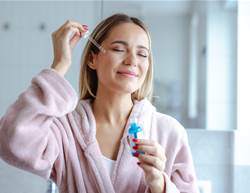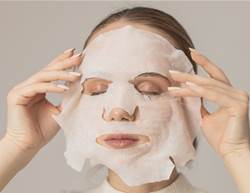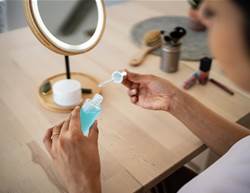We all make inadvertent skincare mistakes, and they can trigger a host of problems, from acne and irritation to fine lines and even premature ageing. Most complexion errors come from going to extremes—either ignoring essential habits like daily SPF and nightly cleansing, or overdoing it with actives and TikTok trends.
The secret to radiant, youthful skin is keeping your barrier—the outermost protective layer—intact. That means nourishing and protecting it, but it’s easy to fall into habits that quietly cause damage.
“Over-exfoliating or not removing makeup can cause a few pimples or a compromised barrier, where you end up with redness and inflammation,” says board-certified dermatologist Dr Mona Gohara. “The consequences run the gamut, from wrinkles and hyperpigmentation to skin cancer if you skip sun protection.”
Here are the skincare mistakes dermatologists say to stop making—plus their advice on how to fix them.
1. Over-exfoliating
Sloughing off dead skin cells is good—if you don’t overdo it. “Going overboard with scrubs or chemical exfoliators can strip the skin’s barrier, leading to redness, breakouts, sensitivity, and even microtears,” says board-certified dermatologist Dr Marisa Garshick.
She explains that barrier disruption can accelerate ageing, fuel inflammation, and increase the risk of hyperpigmentation. It can also worsen conditions like eczema and rosacea. To keep your complexion balanced, derms recommend gentle exfoliation no more than three times per week.
2. Not removing makeup before bed
Falling asleep with makeup on? Time to retire that habit. “Makeup, dirt, sweat, and oil left on the skin create a film that clogs pores and leads to breakouts, irritation, and dullness,” says Dr Gohara.
Skipping cleansing also blocks good ingredients from absorbing, meaning your serums and moisturisers can’t do their job. A few extra minutes at night can save you from months of repairing clogged, inflamed skin.
3. Only wearing SPF in the summer
It bears repeating: Sun exposure is the number one cause of premature ageing, dark spots, and skin cancer. And you don’t need to be lying on a beach to be exposed—UVA and UVB rays come through clouds and windows year-round.
“Using a daily moisturiser with broad-spectrum SPF 30 or higher is the best anti-ageing and health advice I can give you,” says Dr Gohara. Make SPF a non-negotiable step in your routine, every single day.
4. Ghosting your neck and chest
The skin on your neck is thinner and has fewer oil glands than your face, making it drier and more delicate. Yet many people overlook the neck and chest entirely, until brown spots or crepey skin start to appear.
“People use anti-ageing products and sunscreen on their face, but neglect from the jawline down, which creates a noticeable difference,” says board-certified dermatologist Dr Janiene Luke. Her bottom line: treat your neck and chest like your face—cleanse, moisturise, and protect them daily.
5. Layering too many active ingredients
Too much of a good thing can quickly backfire. Maybe you’ve used a glycolic acid peel pad, followed it with retinol, and then added a vitamin C serum—only to wake up with an angry, red complexion.
“Combining strong actives like retinol and chemical exfoliators can overwhelm skin, leading to irritation or even chemical burns,” says Dr Garshick. “Over time this weakens the barrier, causes chronic inflammation, and can precipitate conditions like rosacea.”
Instead of piling everything on at once, pick one active ingredient per night and give your skin time to respond. Less really is more when it comes to actives.
6. Not moisturising enough
Skipping body lotion after the shower or skipping moisturiser if you’ve got combination skin is a mistake. “Even oily skin needs hydration, and without it your skin may overcompensate with oil production or become overly sensitive because the protective barrier is compromised,” says Dr Garshick. This can invite irritation, inflammation, and accelerate ageing. Moisturising head to toe with hydrating ingredients (like hyaluronic acid and glycerin) and emollients (like squalene and ceramides) is essential. It doesn’t need to be heavy or greasy—a simple lotion for dry skin works, as long as you use it consistently.
7. Popping pimples and picking your skin
As satisfying as it feels in the moment, pimple popping causes trauma and inflammation, pushing bacteria deeper and increasing the risk of scarring. “It can also cause discolouration and scarring, particularly in darker skin types that are prone to post-inflammatory hyperpigmentation,” says Dr Luke. If resisting the urge is hard, try using a pimple patch as a spot treatment to protect the area and stop your fingers from interfering.
8. Following too many TikTok trends
SkinTok trends can be entertaining, but not always safe. “What goes viral isn’t always safe, and many of these trends can be harmful and irritating,” says Dr Gohara. Think beef tallow as moisturiser or at-home chemical concoctions. “No one should be taking heart health advice from a non-MD on social media, and the same goes for skincare,” she adds. Bottom line: if it sounds extreme, it probably is.
9. Not adjusting skincare products as you age
Your skin’s needs evolve, and so should your routine. “The skincare that worked for you in your 20s or 30s may not work in your 40s,” says Dr Garshick. Sticking with outdated products can lead to dryness, irritation, or missed opportunities to strengthen your skin with antioxidants, retinol, and peptides. These ingredients help fight free radicals, repair environmental damage, and boost collagen—key for healthy ageing.
10. Underapplying SPF if you have a dark skin tone
“People with darker skin may show delayed signs of photoageing like fine lines, but research shows darker skin is still vulnerable to damage from UV rays,” says Dr Luke. Sun exposure also worsens dark spots and melasma. Daily sunscreen is non-negotiable regardless of skin tone. A mineral or chemical SPF applied generously is key to protecting against long-term damage.
11. Too many late nights
Healthy skin starts with healthy habits—nutrition, hydration, and sleep. “Everything is connected, and skin reflects your health like a mirror,” says Dr Gohara. Without proper rest, your skin misses the chance to repair itself overnight, build collagen, and flush toxins. Alcohol can add to the damage, too. “Even moderate alcohol can negatively affect your skin. For example, a couple of cocktails can trigger glycation, a process that damages collagen and elastin, which accelerates ageing,” she explains. For glowing skin, skip the late nights (and extra drinks) and prioritise real beauty sleep.







.jpg&h=193&w=250&c=1&s=1)


